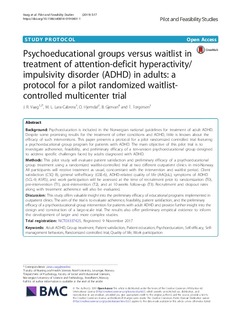| dc.contributor.author | Vaag, Jonas Rennemo | |
| dc.contributor.author | Lara Cabrera, Mariela Loreto | |
| dc.contributor.author | Hjemdal, Odin | |
| dc.contributor.author | Gjervan, Bjørn | |
| dc.contributor.author | Torgersen, Terje | |
| dc.date.accessioned | 2019-09-24T10:24:58Z | |
| dc.date.available | 2019-09-24T10:24:58Z | |
| dc.date.created | 2019-01-11T21:29:27Z | |
| dc.date.issued | 2019 | |
| dc.identifier.issn | 2055-5784 | |
| dc.identifier.uri | http://hdl.handle.net/11250/2618440 | |
| dc.description.abstract | Background
Psychoeducation is included in the Norwegian national guidelines for treatment of adult ADHD. Despite some promising results for the treatment of other conditions and ADHD, little is known about the efficacy of such interventions. This paper presents a protocol for a pilot randomized controlled trial featuring a psychoeducational group program for patients with ADHD. The main objective of this pilot trial is to investigate adherence, feasibility, and preliminary efficacy of a ten-session psychoeducational group designed to address specific challenges faced by adults diagnosed with ADHD.
Methods
This pilot study will evaluate patient satisfaction and preliminary efficacy of a psychoeducational group treatment using a randomized waitlist-controlled trial at two different outpatient clinics in mid-Norway. All participants will receive treatment as usual, concomitant with the intervention and waitlist period. Client satisfaction (CSQ 8), general self-efficacy (GSE-6), ADHD-related quality of life (AAQoL), symptoms of ADHD (SCL-9; ASRS), and work participation will be assessed at the time of recruitment prior to randomization (T0), pre-intervention (T1), post-intervention (T2), and at 10 weeks follow-up (T3). Recruitment and dropout rates along with treatment adherence will also be evaluated.
Discussion
This study offers valuable insight into the preliminary efficacy of educational programs implemented in outpatient clinics. The aim of the trial is to evaluate adherence, feasibility, patient satisfaction, and the preliminary efficacy of a psychoeducational group intervention for patients with adult ADHD and provide further insight into the design and construction of a large-scale trial. The results also offer preliminary empirical evidence to inform the development of larger and more complex studies. | nb_NO |
| dc.language.iso | eng | nb_NO |
| dc.publisher | BMC (part of Springer Nature) | nb_NO |
| dc.rights | Navngivelse 4.0 Internasjonal | * |
| dc.rights.uri | http://creativecommons.org/licenses/by/4.0/deed.no | * |
| dc.title | Psychoeducational Groups versus Waitlist in Treatment of Attention-Deficit Hyperactivity/Impulsivity Disorder (ADHD) in Adults: A Protocol for a Pilot Randomized Waitlist-Controlled Multicenter Trial. | nb_NO |
| dc.type | Journal article | nb_NO |
| dc.type | Peer reviewed | nb_NO |
| dc.description.version | publishedVersion | nb_NO |
| dc.source.journal | BMC Pilot and Feasibility Studies | nb_NO |
| dc.identifier.doi | 10.1186/s40814-019-0401-1 | |
| dc.identifier.cristin | 1655413 | |
| dc.description.localcode | © The Author(s). 2019 Open Access This article is distributed under the terms of the Creative Commons Attribution 4.0 International License (http://creativecommons.org/licenses/by/4.0/) | nb_NO |
| cristin.unitcode | 194,67,40,0 | |
| cristin.unitcode | 1920,17,0,0 | |
| cristin.unitcode | 1920,23,0,0 | |
| cristin.unitname | Institutt for psykologi | |
| cristin.unitname | PH - Avdeling for forskning og utvikling | |
| cristin.unitname | PH - Orkdal distriktspsykiatriske senter | |
| cristin.ispublished | true | |
| cristin.fulltext | original | |
| cristin.qualitycode | 1 | |

